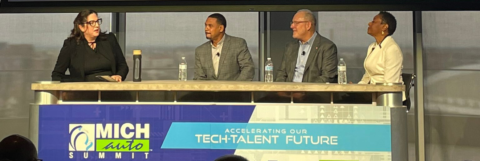As the automotive and mobility industry continues to transition to electrification, companies are expanding, readjusting, and seeking talent to meet their new needs. But how can companies ensure these new opportunities are accessible to communities that have been historically excluded from workforce development investment and recruitment strategies? Kerry Duggan, Founder and Chief Executive Officer of SustainabiliD moderated this conversation featuring:
- Kimathi Boothe, Vice President, Energy Operations, Dunamis Clean Energy Partners,
- Michael Simonte, President, American Axle & Manufacturing, and
- Carla Walker-Miller, Founder and Chief Executive Officer, Walker-Miller Energy Services LLC
If You are Not Intentionally Inclusive, You are Unintentionally Exclusive
Duggan opened the conversation by asking the panelists what inclusion looks like in each of their companies. Boothe responded first by emphasizing that inclusivity goes beyond what we typically consider such as race, ethnicity, and gender. It’s also about how diversity of life experiences such as age, socioeconomic status, and geography can inform someone’s unique perspective. Simonte said that his company has been focusing on creating an environment in which his employees feel like they are respected, appreciated, and belong to something important. From Walker-Miller’s point of view as someone who has fought to be included her entire career, “no matter what your thoughts are, if you are not intentionally inclusive, you are by nature unintentionally exclusive.”
It’s Not a People Shortage, It’s a Talent Shortage
When it comes to what the future looks like and who is participating, Boothe said that as Dunamis expands its Michigan operations, they are seeking to hire within three miles of their Detroit plant. They’ve incorporated economic and community development into their business model to invest in the surrounding community and offer opportunities to those who, historically, have been excluded from them. He said the goal of locating the plant in the city of Detroit was to help employees “not only develop their own skillsets but take them back into their community to develop other entrepreneurial and innovative solutions,” which will allow them to “solve issues and attack problems at the heart of where the impact is greatest.” Simonte echoed that “we don’t always look like the communities in which we operate,” which is why companies must consider every talent pool when making recruitment strategies. Walker-Miller expanded that “it’s not a people shortage, it’s a talent shortage.” She continued, stating that companies must adjust their strategies when targeting communities that have not historically felt welcome in those spaces. She and Boothe agreed that in order to reach these hesitant people, companies will need to be the ones to reach out with a personal invitation and strong programs to train them.
“We have to be creative and courageous enough to go outside of our natural networks,” Walker-Miller answered when asked how companies can get the word out. Simonte said that his company built its team by using its existing networks, because “good, high-performing people know other good, high-performing people.” However, this led to an unintentional exclusivity that left them with people that looked the same and were from the same places. Boothe added that with deadlines and budgets to consider when recruiting, it’s often the easiest route to take. He said, “It takes investment in a longer and broader ecosystem that doesn’t just attract people for a one-time deal but attracts them because Michigan invests in their talent.”
Equity is Built When We Leave Our Comfort Zones
Reflecting on what his company is doing to support new recruits, Boothe said Dunamis is forging partnerships with community organizations and fellow entrepreneurs to build out a collaborative ecosystem so that together they can educate the community on the benefits of opportunities available in electrification and mobility. Simonte noted that while his company is “fishing in new ponds” when hiring, they are also focused on retaining talent by shifting their development strategy to include early career development so candidates can be even more prepared before entering the workforce.
In their equity journey, Walker-Miller Energy Services has been working with Michigan Rehabilitation Services to engage with a demographic that has the lowest labor participation in the country. Walker-Miller acknowledged that having a disability on top of another diverse identification compounds to increase barriers to opportunities. She urged everyone to reach past their comfort zones, look around, and ask, “who is not at this table?” then intentionally reach out to engage them.

